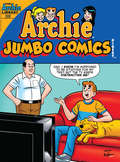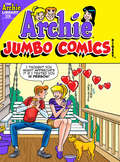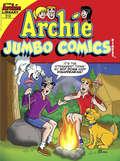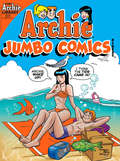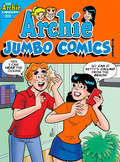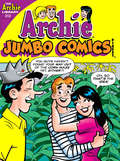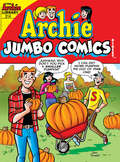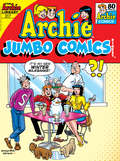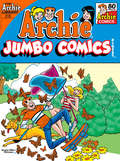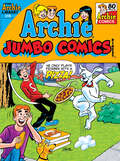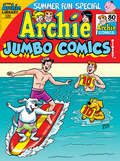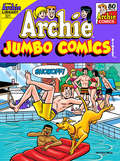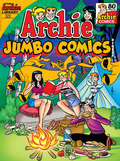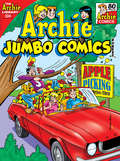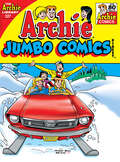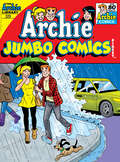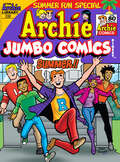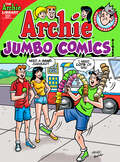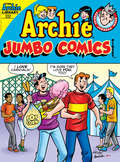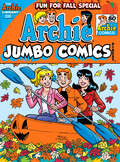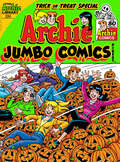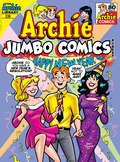- Table View
- List View
Archie Double Digest #308 (Archie Double Digest #308)
by Archie SuperstarsBRAND NEW STORY: “Garage Barrage!” Archie and his dad have an important mission to complete: cleaning the garage! Will they get the job done in time or will memories and nostalgia get the best of them?
Archie Double Digest #309 (Archie Double Digest #309)
by Archie SuperstarsBRAND NEW STORY: “Dogging the Cat Burglar!” Archie is dog-sitting his best friend Jughead’s beloved pooch Hot Dog. Will Hot Dog and Vegas become a dynamic doggy duo? Find out when these two are put to the ultimate test in canine loyalty!
Archie Double Digest #310 (Archie Double Digest #310)
by Archie SuperstarsBRAND NEW STORY: “Lost at Sea!” Archie and Jughead decide to go on a fishing trip at sea for a guys’ getaway. Unfortunately, when both of them fall asleep on the boat, they wake up far from home—and far from shore!
Archie Double Digest #311 (Archie Double Digest #311)
by Archie SuperstarsGet ready for fun at the beach (and under the sea!), hang ten with the Riverdale crew and hav a true camp experience--and see if Archie will answer the most important question of all question: Betty or Veronica? This digest is filled with laughs and entertainment!
Archie Double Digest #312 (Archie Double Digest #312)
by Archie SuperstarsCheck out the exciting adventures of Archie Andrews in this super-size book! With a blend of modern and classic stories, puzzles, games, and more special features, you can’t go wrong!
Archie Double Digest #313 (Archie Double Digest #313)
by Archie SuperstarsHave some fun with Archie in this jumbo-size digest! With a blend of modern and classic stories, puzzles, games, and more special features, you’ll be entertained for days!
Archie Double Digest #314 (Archie Double Digest #314)
by Archie SuperstarsBRAND NEW STORY: “The Problem with Pumpkin!” Archie finally loses it with everyone’s fall obsession of everything pumpkin! He swears off pumpkin and insists on everyone doing the same… that is until he tries Betty’s pumpkin doughnuts!
Archie Double Digest #315 (Archie Double Digest #315)
by Archie SuperstarsBRAND NEW STORY: “That Elf is Shelved!” When Jingles takes over as the Andrews Household’s resident “Elf on the Shelf,” Santa’s nosy helper keeps interfering and causing trouble! Archie and Jughead decide to give him a dose of his own medicine, getting him in trouble with his boss…. the one and only Santa Claus himself!
Archie Double Digest #316 (Archie Double Digest #316)
by Archie SuperstarsBRAND NEW STORY: Archie and Jughead decide to go into business with a sure-fire money maker… a HOT CHOCOLATE STAND! In the cold of winter, they figure they can make a mint! But will their hot business get frozen when a huge blizzard arrives?
Archie Double Digest #317 (Archie Double Digest #317)
by Archie SuperstarsBRAND NEW STORY: “Pop’s Purr-fect Birthday!” Archie and his friends are surprising Pop Tate with a special birthday dinner at a brand new fancy restaurant in Riverdale. Little do they know, Pop actually knows the celebrity chef owner—in fact, they’re old rivals! Will Pop’s birthday dinner be perfect… or a purrfect mess?
Archie Double Digest #318 (Archie Double Digest #318)
by Archie SuperstarsBRAND NEW STORY: “I’m Diggin’ It!” It’s Archie vs. groundhog as the little creature keeps stealing all the bulbs Archie’s been planting in his mom’s garden. Will he be able to defeat the wily mammal, or will he just feel like he’s having the same problem day after day?
Archie Double Digest #319
by Firstname LastnameLorem ipsum dolor sit amet, consectetur adipiscing elit, sed do eiusmod tempor incididunt ut labore et dolore magna aliqua. Lacus vestibulum sed arcu non odio euismod lacinia. Tincidunt vitae semper quis lectus nulla at. Non tellus orci ac auctor augue mauris augue neque gravida. Pellentesque elit eget gravida cum sociis natoque penatibus et. Pharetra massa massa ultricies mi quis. Ultrices mi tempus imperdiet nulla malesuada pellentesque elit eget. Id ornare arcu odio ut sem. Ac turpis egestas integer eget. Arcu bibendum at varius vel. Lectus urna duis convallis convallis tellus id interdum velit laoreet. Elit eget gravida cum sociis natoque penatibus. Ac tortor vitae purus faucibus ornare.
Archie Double Digest #320 (Archie Double Digest #320)
by Archie SuperstarsBRAND NEW STORY: “Mow Mantle, Mow Problems!” When Archie lands a summer gig mowing lawns, Reggie’s determined to steal his business away! But is the grass greener on Reggie’s side of the street?
Archie Double Digest #321 (Archie Double Digest #321)
by Archie SuperstarsBRAND NEW STORY: “Ruff Summer!” Archie’s got a new job as a lifeguard at the beach… but it’s Archie’s dog Vegas who’s having his moment in the sun when he helps save a swimmer! Vegas soon becomes the star of the beach—but will it last?
Archie Double Digest #323 (Archie Double Digest #323)
by Archie SuperstarsBRAND NEW STORY: “Chill Out!” Archie and the gang are going camping! But when Reggie informs them that their campsite used to be an old burial ground, the crew wonders if they will be able to make it through the night!
Archie Double Digest #324 (Archie Double Digest #324)
by Archie SuperstarsBRAND NEW STORY: “Archie Appleseed” Four years ago Archie had the idea to plant apple trees in all of his friends and neighbor’s yards. This year the trees began bearing fruit, but it’s way more fruit than anyone had anticipated! Now with Riverdale covered in apples, it’s up to Archie Appleseed himself to figure out how to get to the core of the problem!
Archie Double Digest #325 (Archie Double Digest #325)
by Archie SuperstarsBRAND NEW STORY: “Up on the Housetop” Betty is determined to catch a glimpse of Santa Claus in the flesh this year. So much so that she invites Archie to tag along with her for a night spent camping out on the roof, awaiting Santa’s sleigh to make its arrival! Will the two be able to stay awake and see the big man in red for themselves?
Archie Double Digest #327 (Archie Double Digest #327)
by Archie SuperstarsBRAND NEW STORY: “Snow Excuse” Archie brings his car to school for some “free” repairs, courtesy of Riverdale High shop class. Unfortunately, prankster extraordinaire Reggie is in his shop class, and he gets a few of their classmates to pull an over-the-top seasonal prank: namely, turning Archie’s car into a snowmobile! What will happen to Archie’s beloved Ol’ Betsy next? And when it starts to snow, will Reggie’s practical joke actually be practical?
Archie Double Digest #329 (Archie Double Digest #329)
by Archie SuperstarsBRAND NEW STORY! Archie tries to become a YouTube star by recording a series of “How To” tutorials. Each one turns out to be a disaster, forcing him to change his title from “how to” to “How NOT To!”
Archie Double Digest #330 (Archie Double Digest #330)
by Archie SuperstarsBRAND NEW STORY! “Jurassic Farce!” Travel back in time to the world of ‘Archie 1’! A prehistoric version of Archie and the gang have been noticing how many traffic jams there are with all the dinosaurs clogging up the roadways. There has to be another way to remedy this situation! Cue caveman genius Dilton, who’s devised a system of air travel featuring the pterodactyls. What could possibly go wrong?!
Archie Double Digest #331 (Archie Double Digest #331)
by Archie SuperstarsFEATURING TWO BRAND NEW STORIES! First, “Volley Folly” Chuck has an idea for a side hustle on the beach—he wants to paint custom volleyballs! He gives a free sample to Jughead in hopes that Jug will talk it up and promote it. The ball has Jughead’s face painted on it and Jug loves it. But soon after, Jughead notices weird things are starting to happen, like whenever the ball gets hit, Jughead feels it! Is there more to this novelty volleyball than meets the eye? Then, Bingo Wilkin returns in “Bad Blood Buds”! When Samson and Willie (Samantha and Bingo’s dads) are in feud mode, Bingo and Samantha declare that their true love will prevail in the face of adversity. An idea is born, and the two dads decide to act like best pals to see if that might derail their kids’ romance, since nothing else has worked. With tensions mounting in Samantha and Bingo’s romance as their dads begin to get along, Bingo is in need of some sage advice: enter Jughead Jones, Bingo’s cousin! Can he help salvage their romance and put an end to their fathers’ constant feuding? Maybe after lunch and a long nap.
Archie Double Digest #332 (Archie Double Digest #332)
by Archie SuperstarsTWO BRAND NEW STORIES! First, Trev and Archie are getting into parkour but it seems like a lot of effort to Jughead for not much of a return. Will he jump into this new trend or let it fly past him? Then, in “What a Twyst!” Trula Twyst is always trying to understand the male psyche, especially Jughead’s! Learning the power of hypnotism, she tries to hypnotize Jughead into opening up about his real feelings for her!
Archie Double Digest #333 (Archie Double Digest #333)
by Archie SuperstarsTWO BRAND NEW STORIES! First, “3 Goes Into Three…” three is the magic number in this special 333rd issue! And you know what has three sides? A triangle! And triangles are important to Riverdale—well, at least one is: Archie, Betty, and Veronica’s love triangle! But triangles aren’t the only special shapes in Riverdale, see what other geometrical figures pop up in this fun story! Then, in “Case of the High Grade Hacker!” An internet threat known only as “Pseudo” has come to Riverdale. They’re attacking school databases, and wiping out all students’ grading data. Worried that this will cause Archie to have to repeat the school year, he enlists the help of Detective Sam Hill to crack down on this hacker!
Archie Double Digest #334 (Archie Double Digest #334)
by Archie SuperstarsTWO BRAND NEW STORIES! First in “A Very Cosmo Halloween!” Cosmo the Merry Martian—or someone who looks an awful lot like Cosmo—crashes the Lodge Halloween Ball. Fortunately, this year it’s science fiction-themed! Cosmo tries to warn the teens of an impending invasion—but will they be able to tell them apart from the costumed aliens at the party? Then, in “Here Come the Power Pets!” The Superteens battle an evil villain called Snowboy. As Snowboy uses his powers to put the Superteens in a deep freeze, Archie’s beloved dog Vegas realizes that he’s got to find a way to rescue them. He gathers Vader, Hot Dog and Carmel and convinces them to join him. Our new heroes become the Power Pets, but do they have what it to rescue their humans?
Archie Double Digest #336 (Archie Double Digest #336)
by Archie SuperstarsBRAND NEW STORY! In “Resolution Impossible!” the gang makes a New Year’s resolution to not to lie or exaggerate. To oversee this, Veronica’s cousin Marcy is to watch over them. In a week’s period, the team that lies the least is the winner. Can they keep up with their resolution for longer than a week? And does Marcy have what it takes to keep them all in line?
